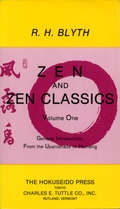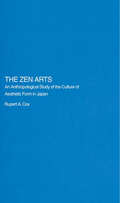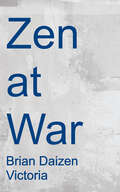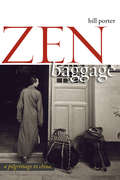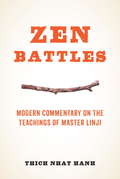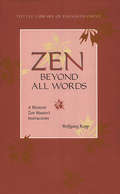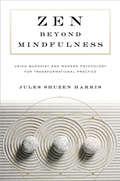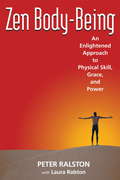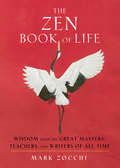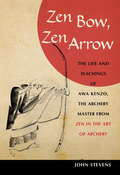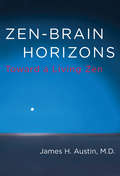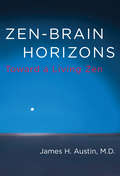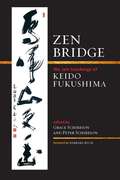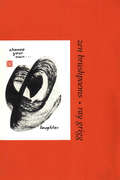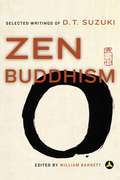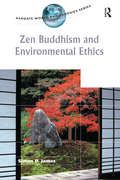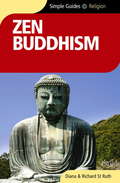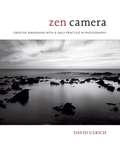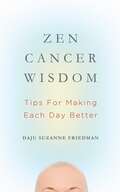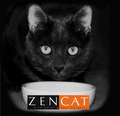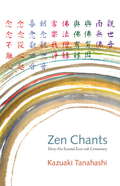- Table View
- List View
Zen and Zen Classics volume 1
by R. H. BlythThis is not a dry scholarly book on Zen.It is a fascinating introduction into a study of self-enlightenment and inner reason that has been a driving force of all Japanese culture. Written by Reginal Horace Blyth (1898-1964) this is a volume free of the dry pedantry that has hobbled so many well meaning French and English studies of Zen. It is free also of the breathless mystery-mongering that unfortunately has bloated American Zen.Blyth reads easily. The questions he poses; the views he offers....all lead to a sense of inner self and an awakening ofan awareness of the surrounding universe and one's relationshipto it.After discussing "What is Zen?" (and what isn't) Blyth sketches a history of Zen dating from 1000 B.C. to715A.D., the year of the death of the Sixth Patriarch, Huineg. With a historical background thus established, Blyth next providestranslations and commentary on some of the most important and basic Zen literature in existence. For the Zen initiate then, this book is an excellent beginning. For the practitioner, further meaningful revelations await.
The Zen Arts: An Anthropological Study of the Culture of Aesthetic Form in Japan (Royal Asiatic Society Books)
by Rupert CoxThe tea ceremony and the martial arts are intimately linked in the popular and historical imagination with Zen Buddhism, and Japanese culture. They are commonly interpreted as religio-aesthetic pursuits which express core spiritual values through bodily gesture and the creation of highly valued objects. Ideally, the experience of practising the Zen arts culminates in enlightenment.This book challenges that long-held view and proposes that the Zen arts should be understood as part of a literary and visual history of representing Japanese culture through the arts. Cox argues that these texts and images emerged fully as systems for representing the arts during the modern period, produced within Japan as a form of cultural nationalism and outside Japan as part of an orientalist discourse.Practitioners' experiences are in fact rarely referred to in terms of Zen or art, but instead are spatially and socially grounded. Combining anthropological description with historical criticism, Cox shows that the Zen arts are best understood in terms of a dynamic relationship between an aesthetic discourse on art and culture and the social and embodied experiences of those who participate in them.
Zen at War
by Brian Daizen VictoriaA compelling history of the contradictory, often militaristic, role of Zen Buddhism, this book meticulously documents the close and previously unknown support of a supposedly peaceful religion for Japanese militarism throughout World War II. Drawing on the writings and speeches of leading Zen masters and scholars, Brian Victoria shows that Zen served as a powerful foundation for the fanatical and suicidal spirit displayed by the imperial Japanese military. At the same time, the author recounts the dramatic and tragic stories of the handful of Buddhist organizations and individuals that dared to oppose Japan's march to war. He follows this history up through recent apologies by several Zen sects for their support of the war and the way support for militarism was transformed into 'corporate Zen' in postwar Japan. The second edition includes a substantive new chapter on the roots of Zen militarism and an epilogue that explores the potentially volatile mix of religion and war. With the increasing interest in Buddhism in the West, this book is as timely as it is certain to be controversial.
Zen Baggage: A Pilgrimage to China
by Red PineIn the spring of 2006, Bill Porter traveled through the heart of China, from Beijing to Hong Kong, on a pilgrimage to sites associated with the first six patriarchs of Zen. Zen Baggage is an account of that journey. He weaves together historical background, interviews with Zen masters, and translations of the earliest known records of Zen, along with personal vignettes. Porter's account captures the transformations taking place at religious centers in China but also the abiding legacy they have somehow managed to preserve. Porter brings wisdom and humor to every situation, whether visiting ancient caves containing the most complete collection of Buddhist texts ever uncovered, enduring a six-hour Buddhist ceremony, searching in vain for the ghost in his room, waking up the monk in charge of martial arts at Shaolin Temple, or meeting the abbess of China's first Zen nunnery. Porter's previously published Road to Heaven: Encounters with Chinese Hermits has become recommended reading at Zen centers and universities throughout America and even in China (in its Chinese translation), and Zen Baggage is sure to follow suit.
Zen Battles: Modern Commentary on the Teachings of Master Linji
by Thich Nhat HanhOne of the key tenets of the Zen school of Mahayana Buddhism is that each one of us is already a Buddha--our enlightenment is inherent within us, and the practice of mindfulness is the tool to bring this truth to our full awareness. <P> While it can bring much relief, this simple statement does not preclude the need for practice. We must strive to always be aware of our Buddha nature, rather than waiting until times of emotional upheaval when it is more difficult to practice. Thich Nhat Hanh uses the teachings of ninth century Zen Master Linji to elaborate on this simple truth and to give readers tools that can help awaken them to their true inner nature. Linji's recorded teachings are the most significant we have from the Ch'an school.One of the unique aspects of Linji's teaching, is the need to "wake ourselves up," not only by means of sitting meditation and listening to enlightened teachings, but also through unique techniques such as the shout, the stick, and the empty fist. Master Linji emphasized direct experience of our true nature over intellectual explorations of the teachings, and he encouraged his students to not "become lost in the knowledge or the concepts of the teaching."Powerful, direct, and uncompromising, Thich Nhat Hanh's reflections on the teachings of Master Linji are destined to become classic Buddhist writings.
Zen Beyond All Words
by Wolfgang Kopp Barbara Wittenberg-HaenauerZen Beyond All Words contains a selection of talks given by MasterWolfgang Kopp at the Tao Ch'an Center in Wiesbaden, Germany, during the summer of 1992. In the spirit of the ancient Chinese Ch'an masters, Wolfgang Kopp teaches a direct and powerful Zen. He conveys neither a theoretical system nor a one-sided dogmatism of sitting, and he neither wears customary robes nor holds a traditional title.
Zen Beyond All Words
by Wolfgang Kopp Barbara Wittenberg-HaenauerZen Beyond All Words contains a selection of talks given by MasterWolfgang Kopp at the Tao Ch'an Center in Wiesbaden, Germany, during the summer of 1992. In the spirit of the ancient Chinese Ch'an masters, Wolfgang Kopp teaches a direct and powerful Zen. He conveys neither a theoretical system nor a one-sided dogmatism of sitting, and he neither wears customary robes nor holds a traditional title.
Zen beyond Mindfulness: Using Buddhist and Modern Psychology for Transformational Practice
by Jules Shuzen HarrisAn effective new approach to Buddhist practice that combines the rigor of traditional meditation and study with the psychological support necessary for practice in modern life.Zen teacher Jules Shuzen Harris argues that contemporary American Buddhists face two primary challenges: (1) “spiritual bypassing,” which means avoiding or repressing psychological problems in favor of “pretend Enlightenment,” and (2) settling for secularized forms of Buddhism or mindfulness that have lost touch with the deeper philosophical and ethical underpinnings of the religion.Drawing on his decades of experience as a Zen practitioner, teacher, and psychotherapist, Harris writes that both of these challenges can be met through the combination of a committed meditation practice, a deep study of Buddhist psychological models, and tools from a psychotherapeutic method known as “Mind-Body Bridging.” Using this unique approach, students can do the real work of awakening without either denying their embodied emotional life or missing out on the rich array of insights offered by Buddhist psychology and the Zen practice tradition.
Zen Body-Being: An Enlightened Approach to Physical Skill, Grace, and Power (Zen Buddhism Ser.)
by Peter Ralston Laura RalstonIn this inspiring guide, Peter Ralston presents a program of "physical education" for anyone interested in body improvement. Using simple, clear language to demystify the Zen mindset, he draws on more than three decades of experience teaching students and apprentices worldwide who have applied his body-being approach. More of a transformative guide than a specific list of exercises devoted to any particular physical approach, Zen Body-Being explains how to create a state of mental control, enhanced feeling-awareness, correct structural alignment, increased spatial acuity, and even a greater interactive presence. Exercises are simple, often involving feeling-imagery and meditative awareness, which have a profound and sometimes instant effect. Where similar guides teach readers what to do, this book teaches readers how to be.From the Trade Paperback edition.
The Zen Book of Life: Wisdom from the Great Masters, Teachers, and Writers of All Time
by Mark ZocchiInspired by the teachings of the Buddha and other great masters, teachers, and writers, this is a book designed to help people connect to their inner divinity and find their spiritual path. It is overflowing with profound quotes, sayings, and insights, each presented alone, allowing the reader to dip in at any time. Each reading is guaranteed to inspire immediately and provide food for thought.Quotations and sayings have been chosen from Gautama Buddha and other "buddhas"--masters of spirituality and inspiration, such as Milarepa, Longchenpa, his Holiness the 14th Dali Lama, Thich Nhat Hanh, and Sogyal Rinpoche, along with other "greats" including Cicero, Rumi, Lao Tzu, Mother Teresa, and Shakespeare. <P><P>A wonderful book to place on your office desk, coffee table, or bookshelf or by your bed, it is designed to provide daily comfort, wisdom, and spiritual nourishment.
Zen Bow, Zen Arrow: The Life and Teachings of Awa Kenzo, the Archery Master from Zen in the Art of A rchery
by John StevensHere are the inspirational life and teachings of Awa Kenzo (1880-1939), the Zen and kyudo (archery) master who gained worldwide renown after the publication of Eugen Herrigel's cult classic Zen in the Art of Archery in 1953. Kenzo lived and taught at a pivotal time in Japan's history, when martial arts were practiced primarily for self-cultivation, and his wise and penetrating instructions for practice (and life)--including aphorisms, poetry, instructional lists, and calligraphy--are infused with the spirit of Zen. Kenzo uses the metaphor of the bow and arrow to challenge the practitioner to look deeply into his or her own true nature.
Zen-Brain Horizons: Toward a Living Zen (The MIT Press)
by Austin James H.In Zen-Brain Horizons, James Austin draws on his decades of experience as a neurologist and Zen practitioner to clarify the benefits of meditative training. Austin integrates classical Buddhist literature with modern brain research, exploring the horizons of a living, neural Zen. When viewed in the light of today, the timeless wisdom of some Zen masters seems almost to have anticipated recent research in the neurosciences. The keen attentiveness and awareness that we cultivate during meditative practices becomes the leading edge of our subsequent mental processing. Austin explains how our covert, involuntary functions can make crucial contributions to the subtle ways we learn, intuit, and engage in creative activities. Austin begins by looking back at ancient Buddhist narratives. He then weaves together the major themes of self, attention, emotion, language, and insight. He goes on to examine Zen and psychology as cultural developments, including recent information about how a clear, calm awareness can change the meditating brain. He considers the pathways through which intuitions develop on their way to becoming realized, exploring the phenomena of the spontaneous color imagery that arises during meditation. Looking out even further into the future, Austin discusses the universal themes of creativity, happiness, openness, and selflessness. Along the way, he bows in homage to William James, explores "Buddhist Botany" and "Avian Zen," demonstrates why living Zen means much more than sitting quietly indoors on a cushion, and provides simplified advice that helps guide readers to the most important points.
Zen-Brain Horizons: Toward a Living Zen (The\mit Press Ser.)
by James H. AustinA neurologist and Zen practitioner clarifies the benefits of meditative training, drawing on classical Buddhist literature and modern brain research.In Zen-Brain Horizons, James Austin draws on his decades of experience as a neurologist and Zen practitioner to clarify the benefits of meditative training. Austin integrates classical Buddhist literature with modern brain research, exploring the horizons of a living, neural Zen. When viewed in the light of today, the timeless wisdom of some Zen masters seems almost to have anticipated recent research in the neurosciences. The keen attentiveness and awareness that we cultivate during meditative practices becomes the leading edge of our subsequent mental processing. Austin explains how our covert, involuntary functions can make crucial contributions to the subtle ways we learn, intuit, and engage in creative activities. He demonstrates why living Zen means much more than sitting quietly indoors on a cushion, and provides simplified advice that helps guide readers to the most important points.
Zen Bridge: The Zen Teachings of Keido Fukushima
by Barbara Ruch Grace Schireson Keido Fukushima Peter SchiresonA funny, poignant, and illuminating masterclass on Zen philosophy and practice from a beloved teacher.Zen Bridge collects Dharma talks given by the Zen master Keido Fukushima Roshi. Fukushima Roshi's anecdotes on his own training are humble, hilarious, and full of wisdom. His reflections on classical teachings intermingle with personal stories, allowing them to be accessible to all readers while at the same time transcendent. The power and authenticity of this true Zen master shines through in his words. This book includes black and white illustrations of basic sitting and hand posture for meditation as well as selections of Fukushima Roshi's calligraphy.
Zen Brushpoems
by Ray GriggZen Brushpoems connects the creative insights of Haiku-like poetry with the dynamic interplay of the written word and painted image. This subtle and profound medium of poetic expression has been inspired by the revolutionary work of Paul Reps
Zen Brushpoems
by Ray GriggZen Brushpoems connects the creative insights of Haiku-like poetry with the dynamic interplay of the written word and painted image. This subtle and profound medium of poetic expression has been inspired by the revolutionary work of Paul Reps
Zen Brushpoems
by Ray GriggZen Brushpoems connects the creative insights of Haiku-like poetry with the dynamic interplay of the written word and painted image. This subtle and profound medium of poetic expression has been inspired by the revolutionary work of Paul Reps
Zen Brushpoems
by Ray GriggZen Brushpoems connects the creative insights of Haiku-like poetry with the dynamic interplay of the written word and painted image. This subtle and profound medium of poetic expression has been inspired by the revolutionary work of Paul Reps
Zen Buddhism: Selected Writings of D. T. Suzuki
by William Barrett D. T. SuzukiNo other figure in history has played a bigger part in opening the West to Buddhism than the eminent Zen author, D. T. Suzuki, and in this reissue of his best work readers are given the very heart of Zen teaching. Zen Buddhism, which sold more than 125,000 as an Anchor paperback after its publication in 1956, includes a basic historical background as well as a thorough overview of the techniques for Zen practice. Concepts and terminology such as satori, zazen, and koans, as well as the various elements of this philosophy are all given clear explanations. But while Suzuki takes nothing for granted in the reader's understanding of the fundamentals, he does not give a merely rudimentary overview. Each of the essays included here, particularly those on the unconscious mind and the relation of Zen to Western philosophy, go far beyond other sources for their penetrating insights and timeless wisdom. What is most important about D. T. Suzuki's work, however--and what comes across so powerfully in these selections--is his unparalleled ability to communicate the experiential aspect of Zen. The intensity here with which Zen philosophy comes to life is without parallel in the canon of Buddhist literature. Suzuki stands apart from all teachers before or since because of his exceptional ability to eloquently capture in words the seemingly inexpressible essence of Zen.
Zen Buddhism and Environmental Ethics (Ashgate World Philosophies Series)
by Simon P. JamesZen Buddhism and Environmental Ethics explores the implications of Zen Buddhist teachings and practices for our moral relations with the natural world. At once an accessible introduction to Zen and an important contribution to the debate concerning the environmental implications of the tradition, this book will appeal both to readers unfamiliar with East Asian thought and to those well versed in the field. In elucidating the philosophical implications of Zen, the author draws upon both Eastern and Western philosophy, situating the Zen understanding of nature within the Buddhist tradition, as well as relating it to the ideas of key Western philosophers such as Aristotle, Kant and Heidegger. These philosophical reflections on Zen are used to shed light on some prominent debates in contemporary environmental ethics concerning such issues as the intrinsic value of nature.
Zen Buddhism - Simple Guides
by Diana St. RuthTHIS BOOK WILL HELP YOU* to appreciate the significance of this particular school of Buddhism,famous for its focus on meditation and self-awakening* to understand the history of Zen and the 'Ways of Zen'* to discover how Zen is a way of life -- not a belief system* to avoid faux pas in conversation, in travelling and in personal relationships. Zen (in Chinese, Ch'an) is the form of Buddhism which the great teacher Bodhidharma brought to China from India in the late fifth century. Today it is practised mainly in Japan and Korea,. Based upon the understanding that each of us has the potential for complete awakening, Zen is in fact a coalition of practical ways of stilling the mind in order to attain self-knowledge. Because the realization of the true nature of reality, including one's own, is not an intellectual pursuit but an experienced truth, Zen teachers transmit the truth (dharma) from mind to mind or heart to heart without the use of words, using different techniques to break through the limitations of the logical mind. This engaging book explains the essence of Zen in simple terms. It traces its development and looks at its unique methods of teaching, such as meditation, koans -- startling paradoxes that stop the intellect -- the use of texts, ceremonies, poetry, and the martial arts. It describes life in monasteries and in the everyday world. Because Zen is rooted in Reality, its practitioners often experience a delightful sense of wonder in the commonplace. This democratic and liberating philosophy does not require us to give up our own traditions, but rather helps us to deepen our understanding of them, and continues to inspire growing numbers of followers in the West.
Zen Camera: Creative Awakening with a Daily Practice in Photography
by David UlrichZen Camera is an unprecedented photography practice that guides you to the creativity at your fingertips, calling for nothing more than your vision and any camera, even the one embedded in your phone. David Ulrich draws on the principles of Zen practice as well as forty years of teaching photography to offer six profound lessons for developing your self-expression. Doing for photography what The Artist’s Way and Drawing on the Right Side of the Brain did for their respective crafts, Zen Camera encourages you to build a visual journaling practice called your Daily Record in which photography can become a path of self-discovery. Beautifully illustrated with 83 photographs, its insights into the nature of seeing, art, and personal growth allow you to create photographs that are beautiful, meaningful, and uniquely your own.You’ll ultimately learn to change the way you interact with technology—transforming it into a way to uncover your innate power of attention and mindfulness, to see creatively, and to live authentically.
Zen Cancer Wisdom: Tips for Making Each Day Better
by Suzaanne FriedmanWith a much-needed sense of levity, Daju Suzanne Friedman teaches the art of keeping one's body, mind, and spirit together while living with cancer."Layman Wang once asked his attendant,'What would you do if a dragon suddenly arrived here?' His attendant answered, 'I wouldn't pay attention to anything else.' This is how it feels when you've been diagnosed with cancer. Your attention and focus shift dramatically towards just this one thing. While single-minded focus can be beneficial, it is also important to remember that you are more than your diagnosis, and that there is more to life than being a patient." --from the introduction In Zen Cancer Wisdom, Daju Suzanne Friedman--Zen teacher, Chinese medicine doctor, and Qigong specialist--shares the inspirations, insights, and humor that helped her to continue to live fully in the face of cancer. With sections devoted to soothing the spirit, harnessing the mind, nourishing the body, and qigong stretches for soothing aches and pains, Friedman provides thoughtful guidance on topics ranging from hair loss and constipation to coping with stress and learning to laugh again. Each chapter begins with an anecdote drawn from the Zen tradition, followed by personal reflection, and a brief guided practice specifically for cancer patients. Pocket-sized, with short, buoyant chapters, and meditation exercises designed to be practicable anywhere in only a few minutes time, Zen Cancer Wisdom is the perfect companion book for cancer patients.
Zen Cat
by Judith AdlerHow often have we seen cats watching us with intense focus, playing obsessively with a toy, comforting us as they cannily assess our moods, lying calmly in a patch of sunlight? Cats exemplify the essential tenets of Zen philosophy and the desire to find the simple and spiritual in everyday life. They embody utter grace, nonjudgmental devotion, and a sense of spontaneous whimsy. What's more, as we interact with cats, these qualities are reflected back in us.Zen Cat pairs more than 50 charming black-and-white photographs of cats with simple and inspiring quotes from a variety of sources: A fat cat lying on the floor evokes the statement "A hand-rolled dumpling of heaven and earth; I gulped it down and easily it went"; a picture of a cat up for adoption is accompanied by Buddha's question "If we fail to look after others when they need help, who will look after us?" This ingenious coupling of concepts and images reminds us that even the most finicky of our feline friends have a lot to teach us, if only we take the time to learn.
Zen Chants: Thirty-Five Essential Texts with Commentary
by Kazuaki TanahashiA Zen chant is like a compass that sets us in the direction of the awakened life; it is the dynamic, audible counterpart to the silent practice of zazen, or sitting meditation; and it is a powerful expression of the fact that practice happens in community. Here is a concise guide to Zen chants for practitioners, as well as for anyone who appreciates the beauty and profundity of the poetry in dharma. An introduction to the practice is followed by fresh and carefully considered translations and adaptations of thirty-five chants--some common and others less well known--along with illuminating commentary.
